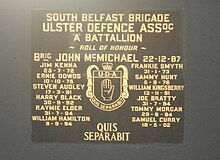Raymond Elder
Raymond Elder (c. 1962 – 31 July 1994) was a Northern Irish loyalist paramilitary and a prominent figure within the Ulster Defence Association's South Belfast Brigade.
Suspected by security forces of playing a role in numerous killings, including the Sean Graham shooting, he was shot dead by the Irish Republican Army on the Ormeau Road in 1994.
As such, Elder knew many Catholics and in his youth was involved in sectarian bullying and street fights before he graduated to UDA membership.
[5] Elder's unit, commanded by Joe Bratty, killed numerous Catholics in this period, including Michael Gilbride[8] and Teresa Clinton, the wife of a local Sinn Féin councillor in the lower Ormeau district.
[11] The two were known to drink at the same establishment, the Kimberley Inn, every Sunday and had been observed by IRA members doing so, allowing the attack to be planned well in advance.
[14] The killings of Bratty and Elder, along with that of Ulster Democratic Party (UDP) leader Ray Smallwoods earlier the same month, played a central role in delaying the Combined Loyalist Military Command (CLMC) ceasefire.
The CLMC had been considering declaring a ceasefire following the shootings in Loughinisland, but reversed their decision after these three killings as they believed that any cessation of violence would have been seen by the IRA as a sign of weakness.
[15] This was confirmed by the UDP's David Adams, who said the CLMC was ready to call a ceasefire in late June/early July 1994, although his party colleague Gary McMichael admitted the killings of Elder, Bratty and Smallwoods convinced him that an IRA ceasefire was near as he felt these were long-standing targets who were being killed before calling a halt to hostilities.
[16] Certain hardline elements with the UDA would later claim that Elder's killing had been sanctioned by members of the CLMC who were eager to see a ceasefire as Bratty had been an outspoken opponent of the initiative, although these allegations were never proven.
[18] An August 2014 march commemorating the pair was condemned by both nationalist politicians and the Ulster Unionist Party after it ended with a ceremony in a Housing Executive-funded First World War garden of remembrance close to the Annadale Flats.

